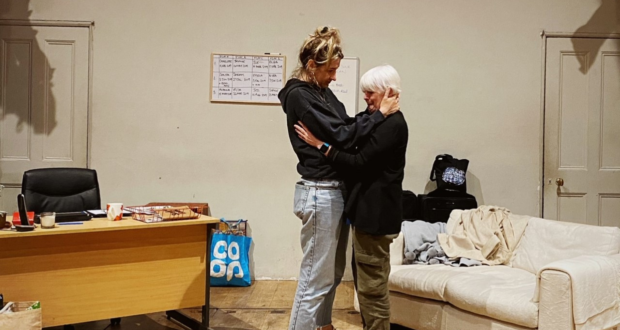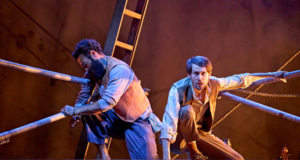A worthy subject matter, but one that strangely left me feeling unmoved. I could appreciate the message it was aiming at even though it just didn't quite work for me personally.Summary
Rating
Good
Reviews are very subjective. Yes, we like to think our opinion is all-important; that we speak for everyone. But ultimately, it’s a personal opinion, which can be affected by many factors, including our own life experiences.
I raise that here because, well, I really didn’t enjoy Refuge. So I ask myself why? Was it because it was poorly written, poorly acted? Maybe the directing didn’t bring all the pieces together? But no, none of that is true. What then caused my dislike? It’s here we return to life experiences. I have spent much of my working life in social housing, so I’ve seen more than enough cases of domestic abuse. I’ve sat with a woman black and blue from her latest beating who told me that ‘it’s ok now, he said sorry’, insisting it was probably her fault for questioning him. I suspect it is this knowledge that made me watch Refuge in a different way to most, and that most likely left me feeling cold about what is probably a much better play than I experienced.
Refuge really is very simple. Its fly-on-the-wall style allows a glimpse of six months within a refuge. We watch staff and residents go about their lives, largely turned upside down because they had the misfortune to fall in love with an abusive partner. There is worn out manager Sandra (Kristin Mcilquham), confessing in a moment of exhaustion that as much as she wants to help these women, she also wants to run away. Supporting her is erratic housekeeper Tanya (Anabela Teixeira), obsessed with signs warning of everything from hot water to “No climing (sic) in the windows”. From this pair we witness the frustrations of trying to help women start new lives, dealing with the red tape of getting them rehoused, the constant pressure of trying to find another room for another victim, or coping with the emotional rollercoaster that being abused will cause.
Then there are the women sharing one of the flats. Sue (Maggie Evans) is sad at being estranged from her daughter who was “always a daddy’s girl”. Jess (Katie Honan) is loud and headstrong, pregnant with her abusers’ baby. Finally, Yalina (Daina Karai), is Pakistani, timid and full of guilt about dishonouring her family by running away, even though it probably saved her life! It’s an unlikely trio, brought together because of one simple fact: all were abused. More vitally, all feel authentic: all are, no doubt, women you would meet should you find yourself in a refuge.
The staging is well thought through, making use of every available inch. The actual stage is Sandra’s office, central to many of the conversations, then to either side, almost in the audience, are two smaller set-ups; one a lounge within the flat where the three woman chat privately, the other a bedroom, where the most intimate conversations happen. It works well, allowing scenes to flow into each other.
As a warts-and-all look at the realities of a refuge, there is much to be admired in how it deals with its topic. I’ve witnessed much of what is portrayed. And maybe that’s why I just felt cold and unmoved come the end. Good theatre should force you to confront difficult truths, should leave you with a better knowledge than you started with, and I hope that this production does that for others watching. It is a gritty, challenging study of a very emotive topic. It just wasn’t one that worked for me.
Written by: Katie Duncan
Directed by: Jess Barton
Produced by: Adam Hemming and Matthew Jameson for Space Productions
Refuge is playing live until 26 June. A digital stream will be available to watch until 10 July. Full details via the below link.
 Everything Theatre Reviews, interviews and news for theatre lovers, London and beyond
Everything Theatre Reviews, interviews and news for theatre lovers, London and beyond



